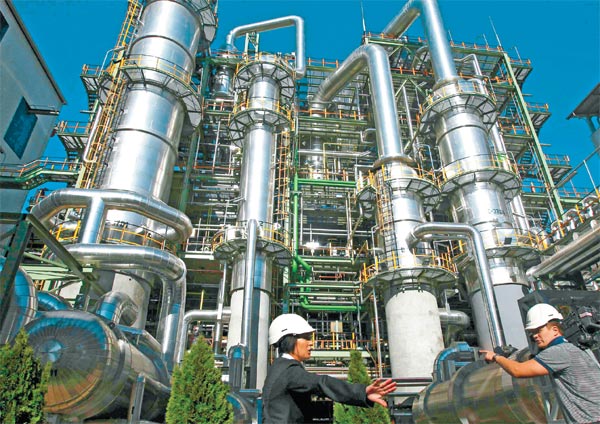Building up in the West
Updated: 2012-07-13 12:34
(China Daily)
|
|||||||||||
A recent report by New York-based Rhodium Group shows how Europe is experiencing the start of a 'structural surge' in outbound direct investment by Chinese firms, Fu Jing reports from Brussels.
 |
|
Workers stand in front of a new production facility at the Hungarian factory of Chinese chemical company Wanhua in Kazincbarcika, 200km east of Budapest. Wanhua took full control of Hungary's BorsodChem last year, creating the world’s third-largest producer of isocyanates. Laszlo Balogh / REUTERS |
Chinese investment in Europe is reported to have tripled in 2011, and estimates are that it could have reached as much as $250-$500 billion by 2020.
Just a decade ago, Chinese investments in Europe were still largely insignificant.
But in recent years, there has been a real explosion. Figures show that China invested $10 billion in Europe in 2011 alone, according to a report just released by the New York-based Rhodium Group.
"Europe is experiencing the start of a structural surge in outbound direct investment in advanced economies by Chinese firms," it said.
The Rhodium report revealed that the sectoral mix of Chinese investment in Europe covers a full range of industries and assets across the continent.
Of the 30 sectors tracked, 18 showed over $200 million in deals; nine showed over $1 billion.
"In terms of new capital, we project $1-2 trillion in global Chinese OFDI from 2010-2020. At that rate, if Europe continues to attract the same share of global FDI as in the 2000s — around 25 percent— then by 2020 Europe would see $250-500 billion cumulatively in new Chinese M&A and greenfield investment," the report said.
"Even if Chinese outflows underperform and Europe ceases to attract as big a share, an annual average of $20-30 billion would be expected for the coming decade."
It concluded: "The heady growth in Chinese investment in Europe described by this study presents an impressive picture that warrants an optimistic outlook for Chinese investment in Europe."
While strengthening economic and trade ties with the advanced economies, China has also been beefing up cooperation with countries in the less traditionally attractive areas of central and eastern Europe in recent years as well.
Leading economist Guo Tianyong, director of the Banking Research Center at the Central University of Finance and Economics in Beijing, has hailed the expansion of Chinese banks into Europe as an "irresistible trend".
The Rhodium Group report was produced in co-operation with China International Capital Corp Ltd. Both agree that growing shares of that projected $250-$500 billion could well come from the eastern end of Europe in years to come, attracted by low costs coupled with greater demands in the area.
The latest move was made by Bank of China (BOC), which opened its Poland branch on June 6, having had a long-time presence in London, Paris and Frankfurt.
The Industrial and Commercial Bank of China (ICBC) has also obtained business permit in Poland and may begin its business soon.
"Expansion eastward in Europe is part of our global strategy to provide services to our clients all over the world," said She Bing, general manager of Bank of China (Luxembourg) S.A. Brussels Branch.
"Poland might be the best-performing economy in central and eastern Europe. It would be strategic to set up a branch to observe, on-the-spot, the market's potentials and the policy environment," She said.
Among the other recent expansion stories of Chinese banks, BOC's Brussels branch was set up in 2010, when ICBC also opened its operation in the EU headquarters.
With the huge economic and employment impact of China's upcoming surge of overseas investment, the authors of the Rhodium report urged European countries to try to maximise the benefits of China's outward economic activities amid the continent's slowdown.
They also urged Europeans to be more open to Chinese banks becoming bigger players in their financial sectors.
After intensive market research, She said his bank is focused on expanding its client database, and offering broader and more comprehensive assistance in financing and trade.
Of the eastern countries, Hungary has sought in particular to position itself as a commercial bridgehead for Chinese companies looking to enter European markets, and the Chinese government has gone to great lengths to get involved in new investment in the country.
In April, Chinese Premier Wen Jiabao and Vice-Premier Li Keqiang respectively visited Poland and Hungary during a European tour. The two leaders signed batches of agreements to boost bilateral economic activities.
"We always try our best to meet the needs of our clients. To this end, we need to move closer to them," She said, hinting that further expansions might be planned in coming months, as Chinese banks plan further openings across the east of the continent.
The Hungarian capital Budapest is already home to a regional branch of BOC and boasts a trade centre to help Chinese companies enter Europe. In addition, the Hungarian capital has a bilingual Hungarian-Chinese primary school, a rarity in the region.
BOC started businesses in Budapest in 2003. Visiting Hungary and opening another branch in Budapest this year, BOC vice-president Yue Yi pledged that his bank would expand its presence.
"We will make Hungary our centre in central and eastern Europe and expand our businesses in this region when conditions allow," Yue said.
Though most of his clients are Chinese companies investing in Europe, She says the bank also offers loans for European companies establishing businesses in China.
"We aim to set up a two-way financial platform," She said, suggesting what many economists already agree that it is sensible to have a Chinese bank handle business related to China.
For example, BOC helped the fast-growing Shanghai-listed producer and marketer of polyurethane raw materials Wanhua Industrial Group take over the Hungarian enterprise Borsodchem in February last year in a 1.2 billion euro ($1.7 billion) deal.
Wanhua had originally planned to enter the European chemicals market by constructing a new plant in the Netherlands. When heavily indebted Borsodchem ran into trouble during the financial crisis, Bank of China stepped in.
Wanhua's intervention, with the help of a BOC-led consortium, was said to secure Borsodchem's long-term future and ultimately saved Hungarian jobs, argued Jason Ding, Wanhua chief executive. The Chinese injected 140 million euros to fund the development of a new chemical plant.
"The pace of Wanhua is faster than the pace that our Hungarian workers were used to," said Wolfgang Büchele, Borsodchem chief executive.
Meanwhile, Chinese commercial banks abroad have shared the same interest to offer services for overseas Chinese communities and diverse representations of Chinese diplomatic bodies, press agencies and other Chinese institutions. Frank Xu, managing director of Investment Banking Department in China International Capital Corp Ltd, said the expansion of Chinese banks is a very recent phenomenon.
Chinese banks' development in Europe, despite their very visible expansion, is still at "the first stage", he said.
By setting up more branches, Chinese banks are seeking after optimum positions on the chessboard, he added.
She Bing adds other Chinese banks planning to merge or invest in European private banks might not be necessarily successful "when certain political perceptions and differences play roles in terms of culture". This is easy to understand, considering European press reports over Chinese banks' move in Europe.
Last year, the BBC referred to Chinese investments in European banks as "Banks: China buys, Europe cries".
But She says perceptions are changing, though slowly. "It depends on our clients. Given the political and economic uncertainty in Europe, some may become more open and turn to Chinese banks. Some may be tempted to invest in the yuan. We need to be patient and have a long-term outlook."
Tan Xuan contributed to the story.









